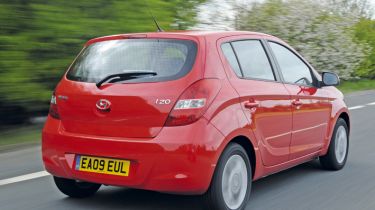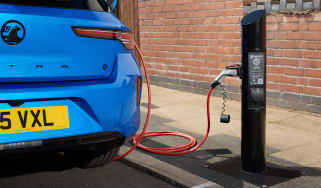Hyundai i20 Comfort
Auto superminis don’t come much cheaper than Korean star
While small cars often try to emulate their larger stablemates, Hyundai hopes its i20 will be as successful as the tiny i10. The city car is the class leader, so can the automatic supermini follow suit?
At £10,845, our Comfort trim hatch has a clear price advantage – it’s £335 less than the base Fabia 1 Tiptronic, and nearly £2,500 cheaper than our Fabia 3 test car, while the Jazz i-SHIFT starts at £12,660. Jump into the Hyundai after a stint in the others, and you won’t feel short-changed, either. Air-conditioning, six airbags, steering wheel stereo controls and a USB connector are all standard.
Video: watch CarBuyer's video review of the Hyundai i20
[[{"type":"media","view_mode":"content_narrow","fid":"69242","attributes":{"alt":"","class":"media-image"}}]]
There is room for improvement on the outside, though, because the i20’s styling looks anonymous next to the Skoda and Honda. Its curving roofline and rounded front end remind us of the Vauxhall Corsa, but the Hyundai needs more character. The same can be said of the cabin.
From behind the wheel the plastics and uninspiring dash show where money has been saved. There’s plenty of cabin space, but with the rear seats in place, its 295-litre boot is the smallest on test. Under the bonnet is a 99bhp 1.4-litre engine, linked to a traditional automatic gearbox with only four ratios – two fewer than its rivals. That blunts performance, and the i20 took one second longer than the Skoda to sprint from 0-60mph at the test track, with a time of 12.5 seconds.
Used - available now

2023 Hyundai
Bayon
31,716 milesAutomaticPetrol1.0L
Cash £13,100
2022 Renault
Zoe
22,382 milesAutomaticElectric
Cash £11,100
2023 Hyundai
Tucson
41,026 milesAutomaticPetrol1.6L
Cash £20,700
2022 Renault
Zoe
17,836 milesAutomaticElectric
Cash £10,000It was two-tenths quicker than the Jazz, but this tells only part of the story. In-gear urge was also compromised, as the Hyundai trailed behind the Honda in every test, accelerating from 30-70mph in 13.7 seconds – that’s 1.7 seconds longer.
It’s not that the i20 feels off the pace – you simply have to push it more to keep up with the others, which doesn’t show the Hyundai in its best light. With large gaps between ratios, the engine races, and you get a jolt in the back as it kicks down to a lower gear under hard acceleration.
Unlike the Honda and Skoda, the Hyundai doesn’t provide a sequential manual function, so the i20 is better suited to a gentler approach. Drive at a more reasonable pace and changes are smoother than those of the Honda Jazz. The poise and grip impressed us, too. The i20 was the most entertaining supermini on test thanks to its strong brakes and responsive chassis – and it proved to be more refined than the Skoda.
]But you pay the price for its four-speed auto at the pumps, because our fuel return of 30.2mpg was the worst in this test. The Fabia was only slightly better at 32.3mpg, although the automated manual box in the Jazz helped it achieve the best fuel economy of our trio, at 40.4mpg. Will that keep the i20 from the top step of the podium, or will Hyundai’s market-leading five-year warranty and low running costs swing the balance in its favour?
Details
Chart position: 2
WHY: The value-for-money i20 undercuts its rivals here, but its automatic box has only four ratios to play with.



